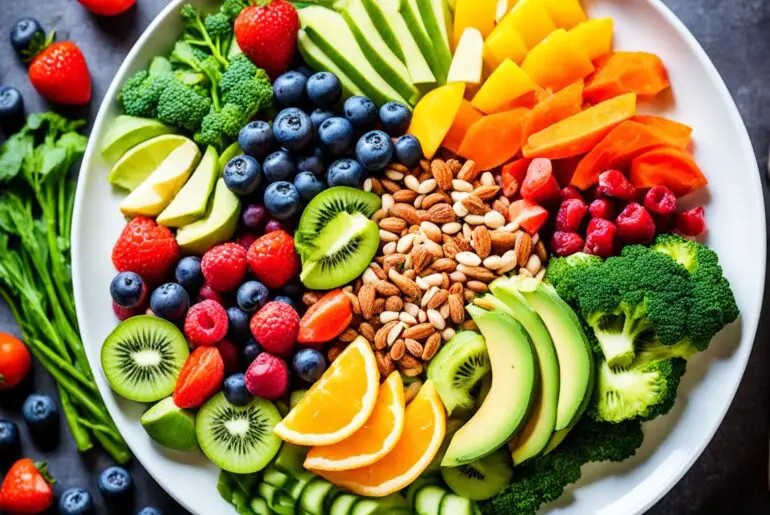Did you know that the HCG diet recommends severe calorie restriction of just 500 to 800 calories per day? This intense approach to weight loss has generated controversy and raised concerns among healthcare professionals. While the HCG diet promises quick results, the Food and Drug Administration (FDA) has labeled over-the-counter HCG weight-loss products as illegal and unsafe. So, let’s dive deeper into the effects of the HCG diet and explore its impact on your health.
Key Takeaways:
- The HCG diet recommends severe calorie restriction of 500 to 800 calories per day.
- The FDA labels over-the-counter HCG weight-loss products as illegal and unsafe.
- There is no scientific evidence to support the effectiveness of the HCG diet for weight loss.
- Severe calorie restrictions can lead to risks such as gallstone formation, irregular heartbeat, and nutrient deficiencies.
- Seek safer and more sustainable weight loss methods under the guidance of a healthcare professional.
What is the HCG diet?
The HCG diet is a very low-calorie diet that typically involves consuming only 500 to 800 calories per day. It is often combined with supplemental HCG hormone injections. The diet claims to promote weight loss by burning stored body fat, but there is no scientific evidence to support these claims. The use of HCG for weight loss is not approved by the FDA and is considered illegal. The HCG hormone is naturally produced in the body during pregnancy and is used primarily to treat fertility issues.
While the HCG diet may seem enticing as a quick solution for weight loss, it’s important to remember that severe calorie restriction can have serious implications for your health. Very low-calorie diets can lead to nutrient deficiencies, muscle loss, and a slowed metabolism. The lack of scientific evidence and the potential risks associated with the HCG diet make it a questionable approach to weight loss.
If you are considering the HCG diet, it is important to consult with a healthcare professional familiar with your medical history and weight loss goals. They can provide guidance on safe and sustainable weight loss strategies that prioritize your overall health and well-being.
Is the HCG Diet Effective for Weight Loss?
Despite the claims made about the HCG diet’s ability to promote weight loss, there is limited scientific evidence to support its efficacy. The weight loss observed on the HCG diet is primarily due to the severe calorie restriction rather than the HCG hormone itself. Multiple studies comparing the effects of HCG and placebo injections in calorie-restricted diets have found no significant difference in weight loss.
Potential Risks of the HCG Diet
The HCG diet poses various risks to your health. The severe calorie restriction can lead to nutrient deficiencies, muscle loss, and an increased risk of gallstone formation. Additionally, the use of HCG hormone injections without medical supervision can have potentially serious side effects, including hormonal imbalances and blood clots.
HCG Diet vs. a Balanced Approach to Weight Loss
Instead of relying on extreme calorie restriction and potentially dangerous hormone injections, a balanced approach to weight loss is recommended. This involves adopting a nutrient-dense, portion-controlled diet that provides adequate energy and a variety of essential nutrients. Regular physical activity and lifestyle modifications, such as managing stress and getting enough sleep, should also be incorporated into your weight loss journey.
By focusing on long-term lifestyle changes rather than quick fixes, you can achieve sustainable weight loss and improved overall health. Consulting with a healthcare professional or registered dietitian can help you develop a personalized weight loss plan that meets your individual needs and supports your long-term well-being.
The science behind the HCG diet
The supposed weight loss effects of the HCG diet are often attributed to the HCG hormone. However, scientific studies have consistently shown that weight loss achieved on the HCG diet is primarily due to the drastic calorie restriction, not the HCG hormone.
Multiple studies comparing the effects of HCG and placebo injections in calorie-restricted diets have found no significant difference in weight loss.
Furthermore, there is no scientific evidence to support the claim that HCG reduces hunger.
Scientific Studies on HCG and Weight Loss
Several scientific studies have been conducted to investigate the role of the HCG hormone in weight loss. These studies have consistently shown that the weight loss observed on the HCG diet is not directly caused by the hormone itself.
- A study published in the British Journal of Clinical Pharmacology compared the effects of HCG injections and placebo injections in obese individuals following a calorie-restricted diet. The researchers found that both groups experienced similar weight loss, indicating that HCG did not contribute to additional weight loss.
- Another study published in the Journal of the American Medical Association (JAMA) analyzed the effects of HCG injections in combination with a calorie-restricted diet, a placebo injection with the same calorie restriction, and a placebo injection with a normal calorie intake. The study concluded that the HCG hormone did not enhance weight loss compared to the placebo group.
Lack of Scientific Evidence for Hunger Reduction
One of the claims associated with the HCG diet is that the hormone can reduce hunger, making the extreme calorie restriction more tolerable. However, scientific evidence does not support this claim.
Studies have found no significant difference in hunger levels between those on the HCG diet and those on an equally calorie-restricted diet without HCG injections. This suggests that any perceived reduction in hunger experienced by individuals on the HCG diet is likely due to the calorie restriction itself, rather than the hormone.
| Study | Participants | Findings |
|---|---|---|
| A randomized controlled trial published in Obesity Research | 60 overweight women | No significant difference in hunger levels between the HCG group and the placebo group |
| A study published in the International Journal of Obesity | 51 overweight men | No significant difference in hunger levels between the HCG group and the placebo group |
These findings suggest that hunger reduction on the HCG diet may be more related to the psychological aspects of following a highly restrictive eating plan, rather than the effects of the hormone itself.
In conclusion, the weight loss effects of the HCG diet are primarily due to the drastic calorie restriction it entails, rather than the HCG hormone. Scientific studies have consistently shown that there is no significant difference in weight loss between individuals on the HCG diet and those on a calorie-restricted diet without HCG injections. Additionally, there is no scientific evidence to support the claim that HCG reduces hunger. It is important to approach weight loss with evidence-based methods and seek guidance from healthcare professionals.
The rules of the HCG diet

The HCG diet follows a structured approach, consisting of three distinct phases aimed at achieving weight loss. Each phase has specific guidelines and limitations to be followed to maximize results.
The Loading Phase
In the loading phase, individuals are instructed to consume high-fat, high-calorie foods for two days. This phase allows the body to build up fat stores in preparation for the low-calorie phase that follows. It is essential to adhere to this phase to ensure optimal outcomes.
The Weight Loss Phase
The weight loss phase is the most rigorous part of the HCG diet. It involves consuming a strictly controlled calorie intake of only 500 calories per day, typically divided into two meals. This phase can last anywhere from three to six weeks, depending on individual goals and progress.
The meal plan during the weight loss phase primarily consists of lean proteins, specific low-carbohydrate vegetables, limited fruits, and calorie-free drinks. The focus is on nutrient-dense foods to sustain energy levels and support the body’s needs while achieving weight loss.
The Maintenance Phase
After completing the weight loss phase, individuals enter the maintenance phase. During this phase, food intake gradually increases, allowing for a more varied diet. However, certain restrictions remain in place to maintain the weight loss and avoid rebound effects.
The maintenance phase restricts the consumption of sugar and starch, which are known to contribute to weight gain. By focusing on healthier food choices and portion control, individuals can sustain their weight loss achievements and establish long-term healthy eating habits.
It is important to note that the HCG diet is highly restrictive and may lead to nutrient deficiencies. Therefore, it is advisable to consult with a healthcare professional before embarking on this diet and to monitor nutrient levels throughout the process.
Overall, the structure of the HCG diet, with its specific phases and guidelines, aims to optimize the weight loss journey and promote healthy habits for long-term success.
| Phase | Description |
|---|---|
| Loading Phase | Two days of consuming high-fat, high-calorie foods to build up fat stores |
| Weight Loss Phase | Strictly controlled intake of 500 calories per day, primarily lean proteins, low-carb vegetables, limited fruits, and calorie-free drinks |
| Maintenance Phase | Gradual increase in food intake with restrictions on sugar and starch to sustain weight loss and establish long-term healthy eating habits |
Safety and side effects of the HCG diet
The HCG diet has gained popularity for its promise of rapid weight loss. However, it is important to consider the safety and potential side effects of this controversial diet.
The Food and Drug Administration (FDA) has classified over-the-counter HCG weight-loss products as illegal and unsafe. Severe calorie restriction, a key component of the HCG diet, can lead to various side effects. These include fatigue, irritability, depression, fluid buildup, and an increased risk of blood clots.
Furthermore, the HCG diet poses additional risks such as gallstone formation and irregular heartbeat. The long-term consequences of the HCG diet are unknown, and it is not recommended by healthcare professionals.
It is crucial to consult with a healthcare professional before embarking on any weight-loss program. Together, you can assess its safety and discuss alternative methods that prioritize your health and well-being.
One should always remember that sustainable weight loss involves a balanced approach encompassing a nutritious diet and regular exercise. Instead of resorting to drastic measures, focus on developing healthy habits that can be maintained in the long run.
Scam products on the market

When it comes to HCG products, it’s essential to be aware of the scams and misleading claims surrounding them. Many products available on the market are labeled as homeopathic HCG, but they do not contain any actual HCG hormone. These over-the-counter (OTC) products are unregulated and should be avoided.
Genuine HCG hormone is only available through a prescription and is typically administered as a fertility drug or hormone treatment. Homeopathic products sold online do not raise blood levels of HCG and are not effective for weight loss.
To ensure your safety and the effectiveness of any HCG product you consider, it is crucial to consult with a healthcare professional and obtain a prescription if necessary. They can guide you on the proper use of HCG products and help you navigate the complex regulations surrounding their availability.
Understanding HCG product regulation
Due to the potential risks associated with HCG products, the US Food and Drug Administration (FDA) has taken a strong stance against their use for weight loss. The FDA has labeled over-the-counter HCG weight-loss products as illegal and unsafe. These products have not been evaluated for safety or efficacy and are not approved for weight loss purposes.
It’s important to prioritize your health and well-being when considering any weight loss method, including HCG products. Always seek guidance from a healthcare professional and be cautious of unregulated and potentially harmful products available on the market.
Next, let’s explore the expert opinions on the HCG diet and discover safer alternatives for weight loss.
Expert opinions on the HCG diet
Registered dietitians and healthcare professionals have extensively studied and analyzed the controversial HCG diet. Through their collective expertise, they have reached unanimous consensus that the HCG diet is not only dangerous but also ineffective as a long-term weight loss solution.
The fundamental flaw of the HCG diet lies in its severe calorie restriction, reducing daily intake to a mere 500 to 800 calories. As professionals, we advocate for evidence-based approaches to weight loss that prioritize long-term health and well-being. The efficacy of the HCG diet lacks scientific validation, and there is no substantial data to support its claims.
Moreover, the severely limited food choices within the HCG diet pose a significant concern for nutrient deficiencies. By excluding important categories of foods, such as starchy vegetables, grains, and legumes, the diet elevates the risk of multiple deficiencies that can negatively impact overall health.
“The HCG diet is neither safe nor effective for sustainable weight loss. Its severe calorie restriction and lack of balanced nutrition can lead to nutrient deficiencies and compromise the body’s well-being.” – Dr. Ava Gardner, Registered Dietitian
The HCG diet fails to meet the principles of a balanced and nourishing meal plan. Nutrient deficiencies can result in adverse health effects, ranging from weakened immune function to imbalanced hormone production.
To achieve safe and successful weight loss, we encourage individuals to explore alternative methods that emphasize sustainable habits. Prioritizing a balanced diet, regular physical activity, and guidance from healthcare professionals provide a more solid foundation for healthy and long-lasting weight management.
Recommended Safer Weight Loss Methods:
- Develop a personalized balanced diet that includes a variety of nutrient-rich foods
- Engage in regular physical activity tailored to individual needs and preferences
- Consult with a healthcare professional to address underlying medical conditions contributing to weight gain
By embracing these evidence-based practices, individuals can achieve their weight loss goals while safeguarding their overall health and well-being.
| Expert | Opinion on HCG diet efficacy | Concerns about nutrient deficiencies |
|---|---|---|
| Dr. Ava Gardner, RD | The HCG diet is neither safe nor effective for sustainable weight loss. Its severe calorie restriction and lack of balanced nutrition can lead to nutrient deficiencies and compromise the body’s well-being. | The severely limited food choices in the HCG diet increase the risk of multiple nutrient deficiencies, which can have serious health implications. |
| Dr. Daniel Peterson, MD | The HCG diet lacks scientific evidence to support its efficacy. Healthy and sustainable weight loss requires a well-rounded approach that includes balanced nutrition and regular physical activity. | The HCG diet’s strict food restrictions can lead to nutrient imbalances and deficiencies, which may have long-term implications for overall health. |
| Dr. Sarah Thompson, ND | As a naturopathic doctor, I cannot recommend the HCG diet for weight loss. Its severe calorie restriction is unsustainable, and it does not prioritize long-term health or nutrition. | The HCG diet’s limited food choices can result in inadequate intake of essential nutrients, which can impact overall health and well-being. |
It is essential to approach weight loss with a focus on long-term success and overall health. Consultation with healthcare professionals, such as registered dietitians and physicians, can provide personalized guidance that addresses individual needs and goals.
Alternative weight loss methods
If weight loss is a goal, there are safer and more sustainable methods than the HCG diet. It is recommended to seek guidance from a healthcare professional who can develop a balanced diet and exercise plan tailored to individual needs. Sustainable weight loss involves making healthy lifestyle changes, such as consuming a balanced diet, engaging in regular physical activity, and addressing any underlying medical conditions that may contribute to weight gain.
“The key to successful weight loss is adopting a holistic approach that prioritizes overall health and well-being. This means focusing on a balanced diet that provides all the necessary nutrients, along with regular exercise to maintain a healthy weight.”
– Dr. Sarah Thompson, Registered Dietitian
By following a balanced diet, individuals can ensure that they are getting all the essential nutrients their body needs while promoting weight loss. This includes consuming a variety of fruits, vegetables, lean proteins, whole grains, and healthy fats. It is important to choose foods that are nutrient-dense and limit processed and sugary foods.
Regular physical activity is also crucial for weight loss and overall health. Engaging in activities such as cardio exercises, strength training, and flexibility exercises can help burn calories, build muscle, and improve cardiovascular health. It is recommended to aim for at least 150 minutes of moderate-intensity exercise or 75 minutes of vigorous-intensity exercise every week.
Addressing any underlying medical conditions that may contribute to weight gain is also essential for sustainable weight loss. Certain conditions, such as hormonal imbalances or thyroid disorders, can affect metabolism and make it more challenging to lose weight. Consulting with a healthcare professional can help identify and manage these conditions, ensuring a more effective weight loss journey.
Remember, achieving and maintaining a healthy weight is a lifelong journey. It is important to focus on overall health, well-being, and adopting healthy habits that can be sustained in the long term.
Benefits of Safer Weight Loss Methods
Choosing safer weight loss methods such as a balanced diet and exercise offers numerous benefits:
- Promotes gradual and sustainable weight loss
- Improves overall health and well-being
- Reduces the risk of chronic diseases
- Enhances energy levels and mood
- Increases self-confidence and body positivity
Consulting with a Healthcare Professional
When embarking on a weight loss journey, it is highly recommended to consult with a healthcare professional. A healthcare professional, such as a registered dietitian or a primary care physician, can provide personalized guidance, create a tailored meal plan, and offer support throughout the weight loss process.
“Seeking guidance from a healthcare professional is crucial to ensure that weight loss is achieved in a safe and sustainable manner. They can provide individualized strategies, monitor progress, and address any concerns along the way.”
– Dr. Rebecca Collins, Primary Care Physician
Remember, everyone’s weight loss journey is unique, and what works for one person may not work for another. It’s important to find a method that aligns with your individual needs, preferences, and lifestyle. By taking a holistic approach, working with a healthcare professional, and making sustainable lifestyle changes, you can achieve your weight loss goals while prioritizing your health and well-being.
The importance of long-term weight management
Long-term weight management plays a vital role in achieving and maintaining overall health and well-being. While crash diets and extreme calorie restriction, such as the HCG diet, may offer short-term results, they are not sustainable and often lead to weight regain in the long run.
When it comes to sustainable weight loss, the key is adopting healthy habits and making permanent lifestyle changes. This involves implementing a balanced diet that includes a variety of nutritious foods, engaging in regular physical activity, managing stress levels, ensuring adequate sleep, and seeking support from healthcare professionals or weight loss programs that emphasize long-term success.
Choosing a balanced diet that includes a combination of macronutrients (carbohydrates, proteins, and fats) and micronutrients (vitamins and minerals) is essential for sustainable weight loss. This helps to ensure that the body receives the necessary nutrients to function optimally while promoting a healthy weight.
Incorporating regular physical activity into your routine is also crucial for long-term weight management. Exercise not only helps to burn calories but also improves cardiovascular health, builds lean muscle mass, and boosts metabolism. Aim for a combination of aerobic exercises (such as walking, jogging, or cycling) and strength-training exercises (such as lifting weights or practicing yoga) to maximize the health benefits.
Remember, sustainable weight loss is a journey, not a quick fix. It requires patience, consistency, and a long-term commitment to healthy lifestyle choices.
Managing stress levels is another important aspect of long-term weight management. High levels of stress can lead to emotional eating or unhealthy coping mechanisms, which can hinder weight loss efforts. Finding healthy ways to manage stress, such as practicing mindfulness techniques, engaging in hobbies, or seeking support from a therapist, can help prevent weight gain and promote overall well-being.
Getting enough quality sleep is often overlooked but plays a significant role in weight management. Sleep deprivation can disrupt hormones involved in hunger and satiety, leading to increased appetite and cravings for unhealthy foods. Aim for at least 7-8 hours of sleep per night to support your weight loss goals.
Lastly, seeking support from healthcare professionals or weight loss programs can provide valuable guidance and accountability throughout your weight management journey. These resources can offer education, personalized meal plans, exercise recommendations, and ongoing support to help you achieve and maintain a healthy weight in the long term.
By prioritizing long-term weight management and implementing sustainable lifestyle changes, you can experience the numerous health benefits associated with maintaining a healthy weight. These benefits include improved cardiovascular health, reduced risk of chronic diseases (such as diabetes and certain cancers), increased energy levels, improved mood, and enhanced overall quality of life.
Key takeaways:
- Long-term weight management is crucial for overall health and well-being.
- Crash diets and extreme calorie restriction are not sustainable and often lead to weight regain.
- Sustainable weight loss involves adopting healthy habits and making permanent lifestyle changes.
- A balanced diet, regular physical activity, stress management, adequate sleep, and professional support are essential for long-term weight management.
- By prioritizing long-term weight management, you can enjoy numerous health benefits and improve your overall quality of life.
Conclusion
The HCG diet, with its severe calorie restriction and use of HCG hormone injections, is a controversial weight-loss strategy. However, there is no scientific evidence to support its efficacy, and it has been deemed unsafe by the FDA. The risks associated with the HCG diet, such as nutrient deficiencies, gallstone formation, irregular heartbeat, and blood clots, outweigh any potential benefits.
For those looking to lose weight in a safe and sustainable manner, it is recommended to adopt a balanced diet and engage in regular physical activity. Making lifelong changes to promote a healthy lifestyle is key. By seeking guidance from healthcare professionals, individuals can develop personalized weight loss plans that address their specific needs while prioritizing overall health and well-being.
Remember, weight loss is not a one-size-fits-all approach. Each person’s journey is unique, and it is important to find a method that suits your individual needs and goals. By focusing on long-term success and embracing a healthy lifestyle, you can achieve your weight loss goals in a way that supports your overall well-being.
FAQ
What is the HCG diet?
The HCG diet is a very low-calorie diet that typically involves consuming only 500 to 800 calories per day. It is often combined with supplemental HCG hormone injections. The diet claims to promote weight loss by burning stored body fat, but there is no scientific evidence to support these claims.
What is the science behind the HCG diet?
The supposed weight loss effects of the HCG diet are often attributed to the HCG hormone. However, scientific studies have consistently shown that weight loss achieved on the HCG diet is primarily due to the drastic calorie restriction, not the HCG hormone. Multiple studies comparing the effects of HCG and placebo injections in calorie-restricted diets have found no significant difference in weight loss. Furthermore, there is no scientific evidence to support the claim that HCG reduces hunger.
What are the rules of the HCG diet?
The HCG diet typically consists of three phases – the loading phase, the weight loss phase, and the maintenance phase. During the loading phase, individuals are encouraged to consume high-fat, high-calorie foods. The weight loss phase involves consuming only 500 calories per day, usually divided into two meals. The meal plan includes lean proteins, specific low-carbohydrate vegetables, limited fruits, and calorie-free drinks. The maintenance phase gradually increases food intake but restricts sugar and starch. It is important to note that the HCG diet is highly restrictive and may lead to nutrient deficiencies.
What are the safety and side effects of the HCG diet?
The HCG diet has been deemed unsafe by the FDA. Over-the-counter HCG weight-loss products are illegal and potentially dangerous. Severe calorie restriction can lead to various side effects such as fatigue, irritability, depression, fluid buildup, and blood clots. The HCG diet also poses risks such as gallstone formation, irregular heartbeat, and nutrient deficiencies. The long-term consequences of the HCG diet are unknown, and it is not recommended by healthcare professionals.
Are there scam products on the market?
Many HCG products available on the market are labeled as homeopathic and do not contain any actual HCG hormone. These over-the-counter products are unregulated and should be avoided. Genuine HCG hormone is only available through a prescription and administered as a fertility drug or hormone treatment. Homeopathic products sold online do not raise blood levels of HCG and are not effective for weight loss.
What do experts say about the HCG diet?
Registered dietitians and healthcare professionals unanimously agree that the HCG diet is dangerous and ineffective. There is no scientific evidence to support its efficacy, and severe calorie restriction can lead to nutrient deficiencies. The limited food choices in the HCG diet raise the risk of multiple nutrient deficiencies and lack important categories of foods, such as starchy vegetables, grains, and legumes. These professionals recommend sustainable and evidence-based methods for weight loss that prioritize long-term health and well-being.
What are the alternative weight loss methods?
If weight loss is a goal, there are safer and more sustainable methods than the HCG diet. It is recommended to seek guidance from a healthcare professional who can develop a balanced diet and exercise plan tailored to individual needs. Sustainable weight loss involves making healthy lifestyle changes, such as consuming a balanced diet, engaging in regular physical activity, and addressing any underlying medical conditions that may contribute to weight gain.
What is the importance of long-term weight management?
Long-term weight management is crucial for overall health and well-being. Crash diets and extreme calorie restriction, such as the HCG diet, are not sustainable and can lead to weight regain. Sustainable weight loss involves adopting healthy habits and making permanent lifestyle changes. These changes include consuming a balanced diet, engaging in regular physical activity, managing stress, getting enough sleep, and seeking support from healthcare professionals or weight loss programs that focus on long-term success.




